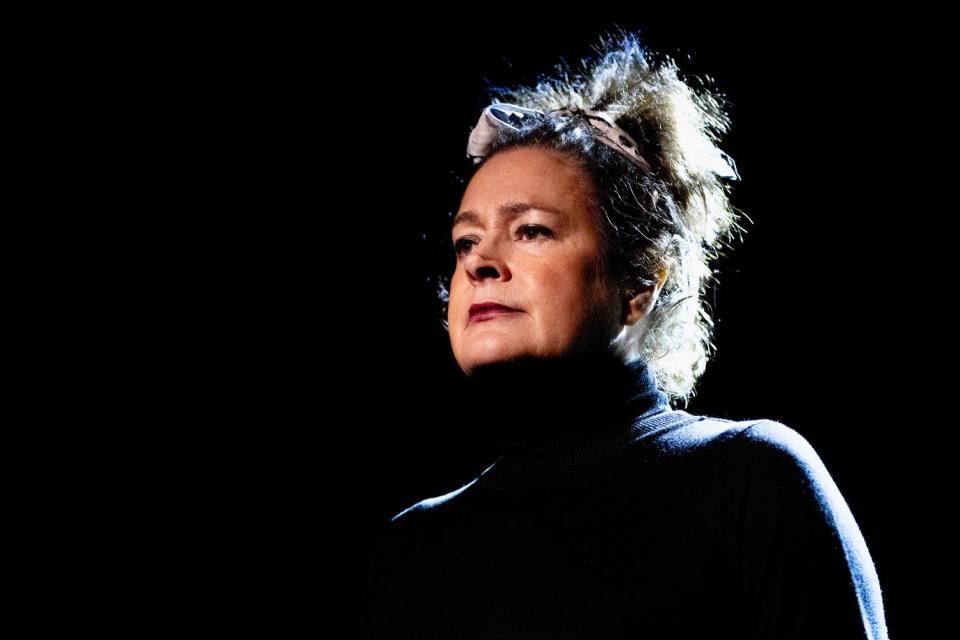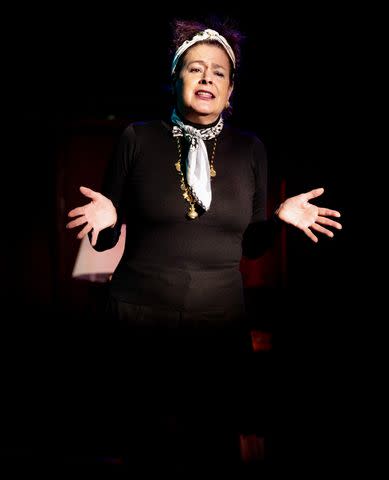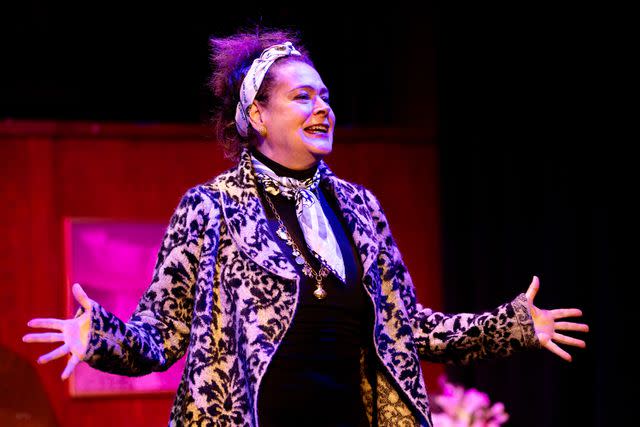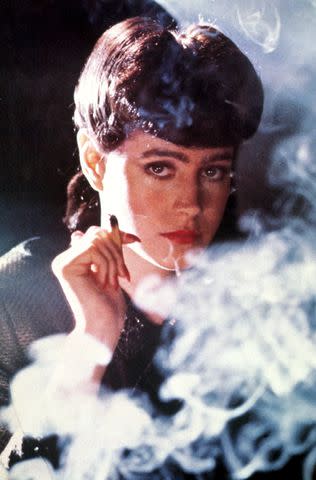Sean Young on How She 'Survived' Hollywood: 'The Industry Has Always Been Predatory' (Exclusive)
- Oops!Something went wrong.Please try again later.
- Oops!Something went wrong.Please try again later.
- Oops!Something went wrong.Please try again later.
The 'Blade Runner' star makes her New York stage debut in the Off-Broadway play 'Ode to the Wasp Woman'

Sean Young has had a storied Hollywood career — but now she's set her sights on the stage.
The actress, 63, best known for a string of successes in the '80s and early '90s, makes her New York theater debut in Ode to the Wasp Woman, written and directed by Rider McDowell.
The Off-Broadway show details the untimely deaths of four doomed 1950s Hollywood stars. Young plays Susan Cabot, a B-movie actress known for The Wasp Woman, who was bludgeoned to death in 1986 by her 22-year-old son.
Unlike Cabot, Young shot to the top of the A-list with her star-making performance as replicant Rachael in Ridley Scott's 1982 science-fiction classic Blade Runner.
The noir thriller only marked Young's third film. She'd go on to appear in David Lynch's Dune (1984), the hit comedy No Way Out (1987) opposite Kevin Costner, and Oliver Stone's Wall Street (1987).
Her career famously soured in later years amid a series of misfortunes and on-set disputes.
She was originally cast as Bruce Wayne’s love interest in Tim Burton’s 1989 Batman. But she was replaced by Kim Basinger when she was injured during filming, though she later publicly lobbied, while in costume, for the role of Catwoman in the sequel, which ultimately went to Michelle Pfeiffer.
After starring alongside James Woods in the 1988 film The Boost, the actor filed a $2 million civil suit against Young, accusing her of stalking behavior. Though they settled out of court, with Young disputing Woods’ allegations, the damage to her career was done. In 2011, she'd appear on Celebrity Rehab with Dr. Drew for alcohol abuse.
In the '90s, at the height of the negative attention that plagued her, Young moved far from Hollywood to Sedona, Arizona, and had two boys, Rio Kelly Lujan, 29, Quinn Lujan, 25, with her husband Robert Lujan.
In an interview with PEOPLE, Young draws similarities between Ode to the Wasp Woman's themes and her own journey, looks back on her early Blade Runner fame, and much more.
Never miss a story — sign up for PEOPLE's free daily newsletter to stay up-to-date on the best of what PEOPLE has to offer, from juicy celebrity news to compelling human interest stories.

Maria Baranova
Sean Young in the play ODE TO THE WASP WOMANPEOPLE: Did you see any of your story in this play about Hollywood failing these four actors?
Young: You go through this stuff in show business. This is actually what kind of fascinated me about the play. Having had some of my own experiences with what the vicissitudes of Hollywood can do to people and the kind of stuff it can put them through, I think, ultimately, you really are in control of your own career. But if you start out young, you're very much influenced by your "handlers" and the people that are supposedly giving you the advice that you need and all this kind of stuff.
It's a business that kind of feeds on youth, in general. I mean, not in all cases. There are people who have aged and continue to maintain their success. But it's a youth-driven business, so it was fascinating to me, the tragedy and the stories of the people that are in the play.
In a press release for the show, you’re quoted as saying, "I'm looking to purge my personal experience of being eaten alive in Hollywood.”
Well, yeah, I think it's true. I'm really glad that I survived whatever I was going through as a famous actress in my 20s and early 30s. I'm really grateful that I got to have a family.
What made you leave Hollywood for Sedona to start your family?
It was like, "If you f---ers can do this, if you could accuse me of stuff and then try to ransack or scuttle my career, then f--- you all. I'm moving to Sedona." Because it was such a shock to me, and I was pretty young. I didn't have a strategy at that point.
And I didn't really have the representation that I needed because back in the day, in my 20s, my mother was my manager, and that was pretty much a disaster. Momagers. Not good for business. Because she didn't really know anything about being a proper manager. So that also didn't help.

Maria Baranova
Sean Young in the play ODE TO THE WASP WOMANBut the whole thing, I really felt like I had a good rep. And then I still continued to work, so I was like, "Okay. Well, I can still work. I got offers." I mean, in my late 30s, they weren't as extremely A-list projects, but they were well-paid and they gave me an income and they gave me a job and I never had to do any other job. So that, to me, is ... that's success.
Do you feel that in today's post-Me Too era what happened to you wouldn't have happened to you?
I don't know if that's true, because look at Bette Davis or Olivia de Havilland. They took on that battle way before I did. Plus they were also in the era of the Golden Hollywood era where perception was even more critical, in a way, than today.
I do think that the industry has always been predatory. I don't think that just happened in recent times.
But we're only seeing a reckoning now, finally, after all these years.
Yeah. But with that comes challenges as well, because then you kind of create an atmosphere where everybody's afraid that they're going to get pointed at. So there's a lot of caution around that too.
You were only 20 when Blade Runner came out, but in interviews at the time you seemed so confident, so sure of yourself.
I think that's true. I think I had my own personality. I've always had a very good sense of humor. I keep people in stitches all day long. And I always felt like I had the right to be me. I didn't feel like I didn't have the right to be me when I started. But then, I learned that, in terms of self-preservation, being me was not necessarily an asset in terms of other people's ego and other people's perception or boundaries or what have you.

Snap/Shutterstock
Sean Young in BLADE RUNNERBecause other people, I discovered, didn't necessarily have the sense of humor that I did. There's a lot of arrogance in the business and a lot of maniacal people in the business. If you're saying something that's really obvious to somebody that might not want to see themself in a certain way, you can offend them.
I might've offended a couple of leading men along the way. It was never my intention, though. That's really true. I just thought everything was very funny. I didn't take it that seriously. I took what I did seriously.
We were talking about this last night in the dressing room. Somebody was saying, "Oh, you're such a great actor." I said, "No, no. I'm not really a great actor. I'm a great soldier." I know how to show up. If somebody tells me what they want of me, I know how to do that really well.
Contrary to what people might think about me, or perceptions, it seems like, outspoken and blah, blah, blah, I had to learn that as an actress. I did not walk into my life as an actress being particularly vocal or talkative.
I remember the first time I had to do The David Letterman Show, I wouldn't say that I had those chops at the time. But I have always, as a person, been funny and had a funny sense of humor. I tried hard to learn what was expected of me, and I think in my 20s, I feel like I did a good job being "outspoken" because that was the thing that you needed to attract attention to your project.
And that's what the producers wanted. That's what they wanted. Because, I mean, you can't walk in and be like a dead fly in the wall. You have to be somewhat amusing or at least entertaining or at least say something. Otherwise you're flat. You're a flat interview, and that just doesn't help your goal of getting the word out, right?
You strike me as someone who should write a memoir.
Oh, I've written 300 pages, but honestly, I got bored with the topic. I could not focus on myself anymore. I wrote it all down up to age 25, so it's like 300 pages.
Are you one to revisit your own work when you come across it?
It's not like I've never done that, but I generally don't. I did this movie called Blue Motel, and it was just such a piece of s---. I couldn't believe it. I watched 10 minutes of it, and I went, "Oh, my God. This is the worst." This was so bad, I couldn't even. And then, kind of from that point on, I really didn't want to see what I had done unless somebody said, "Oh, my God. It's amazing!"
Ode To The Wasp Woman plays a limited 13-week Off-Broadway engagement Nov. 7, through Jan. 31, at The Actors Temple Theatre.
For more People news, make sure to sign up for our newsletter!
Read the original article on People.

